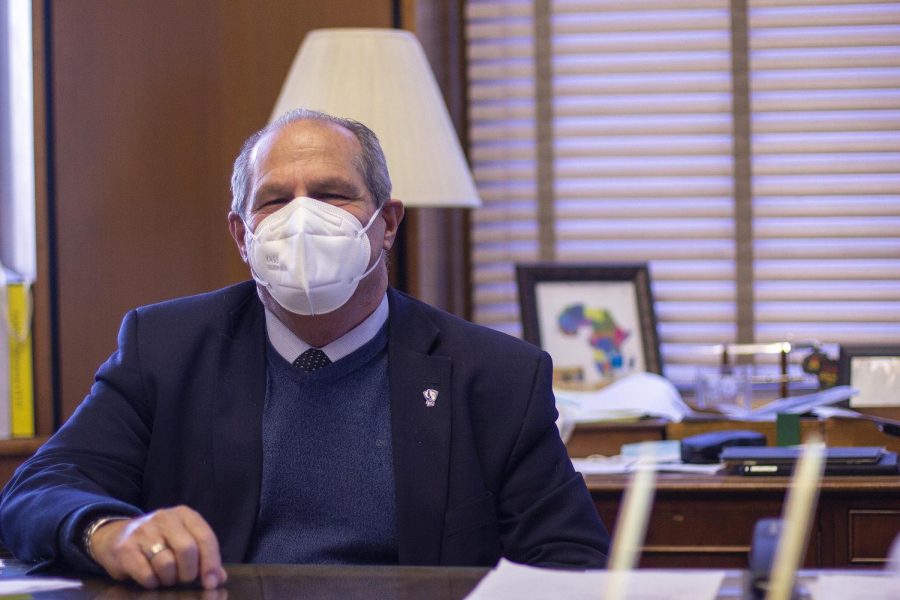Digging up David Glassman’s past
A profile shot of University President David Glassman at his desk in the Presidental Office in Old Main on Monday.
February 21, 2022
In high school, Glassman took a career alignment test that asked him about his interests and abilities to match with professionals who had taken this test.
Glassman’s schooling and professional life
Listening to what his results said, Glassman decided to study to become an accountant.
Glassman started his first year at Arizona State University, and shortly learned that accounting wasn’t for him.
“I had no passion in it and one of the more challenging things for me is that my penmanship was really horrible,” Glassman said. “At that time, you did accounting on paper and had to write [in] little, small boxes.”
Glassman said that if computers were around when he was studying accounting, he would probably be an accountant now.
During his first year of college, he took a general education course on anthropology.
Glassman transferred to University of Minnesota-Twin Cities after his first year of college, still studying accounting.
As a sophomore, Glassman then took another anthropology class at the university.
Glassman said that the one he took before was interesting, so he decided to take another.
Glassman then decided to switch to studying anthropology for his undergraduate degree instead of accounting.
Glassman got interested in biological anthropology because of a professor who was working in his lab analyzing skeletons.
Biological anthropology is the study of humans as biological organisms, not just cultural organisms.
“I [wanted] to study the skeletons of prehistoric people, not fossil people, prehistoric people,” Glassman said.
After receiving his undergraduate degree in Anthropology, Glassman needed a job, so he went to talk to the department chair of anthropology at the University of Minnesota, and he asked Glassman if he knew Spanish.
As part of the foreign language requirement, Glassman had already taken Spanish, so he said he knew it.
“[The chair] said, ‘Well, you know, I’ve got a friend who’s working down in Mexico, an archeologist, and maybe you can go work for him,’” Glassman said. “Now, I’m in Minnesota and I go yeah. I’ll go to Mexico, never been there before.”
Glassman spent around three months in Mexico excavating Aztec skeletons.
After going home, Glassman received a call from the Mexican government saying they wanted him to come back to work at the site.
They wanted him to excavate the skeletons and help them understand who these individuals were and how they lived.
While there, Glassman was convinced by the archeologists there to pursue graduate school.
“So, [the archeologists] said, ‘hey, you need to go to graduate school, you can get a job, you can become a professor,’” Glassman said. “So, I came back from that trip and started applying to graduate schools.”
While applying to graduate schools, Glassman found one where Bill Bass taught at.
Bill Bass had written the manual Glassman used in the field, so he applied to that school.
Glassman was accepted into University of Tennessee-Knoxville where he pursued his graduate degree.
After doing a graduate record exam, Bass said that Glassman was accepted into the program but only on one condition.
“He said there was only one condition though, I could continue to work in the skeleton biology as long as I would also participate in his new area that he was developing,” Glassman said.
This new field was called forensic anthropology, and up until that point, was essentially unknown with very few people practicing it and only three or four programs started across the country.
Compared to biological anthropology, forensic anthropology analyzes the remains of people who have recently been murdered or were found that were missing.
Scientists would work with law enforcement to identify individuals and estimate when the approximate time of death was.
While Glassman was a student at Tennessee, he had the opportunity to study a body farm founded by Bass.
A body farm is a place where people can observe humans decompose under several circumstances.
Environmental factors like temperature, moisture in the air and if animals are nearby influence how bodies decompose.
After graduating from University of Tennessee-Knoxville, Glassman went on to teach and create a forensic anthropology program at Texas State University.
In his career, he worked on approximately 350 cases of human identification for the police.
“It’s a type of job that, depending on the individual, ultimately gets to you,” Glassman said. “You’re working in very challenging situations, and it’s all about death and heinous ways of killing people. It takes your toll; it’s not for everyone.”
Glassman’s Name in Lights
During the first half of his career, people around him thought what Glassman did was crude.
“Everybody thought what I did was gross and weird, and how can you do it, but then I started getting on TV shows like ‘Forensic Files’ and then ‘America’s Most Wanted’ and some of the fictional ones like ‘Bones,’ and then all of a sudden everyone wants to do it,” Glassman said.
Through his career, Glassman was asked to give lectures on anthropology and made appearances on shows like “Skeleton Stories,” “By the Book” and even a movie called “Lonestar.”
Glassman believes that cable TV made the appeal of crime entertainment popular.
“They wanted programming that was inexpensive and also interesting to viewers, so they went out in all different directions: the nature channels, National Geographic, and reality shows, anything to fill up time,” Glassman said. “Crime is something that people are interested in, and certainly murders and things of that nature, people are curious about.”
Glassman said that what he enjoyed about being on air and giving these lectures was that he could tell people the truth about forensic anthropology.
“I’m glad to tell them what’s real and what’s fictitious because what they do on fictitious shows is not what takes place in true human identification cases,” Glassman said.
Glassman’s life on the road
Believe it or not the President of Eastern Illinois University owns and rides a Harley Davidson motorcycle.
Glassman has had an interest in motorcycles for several decades.
Glassman said when riding a motorcycle, it is one of the only times he can get his mind off work.
“When I’m on vacation, I’m thinking about work; when I’m entertaining, I’m thinking about work,” Glassman said. “But when I’m riding a motorcycle, it frees my mind to just enjoy a peace of mind, a peaceful existence.”
Glassman has been to a handful of foreign countries like China, Mexico, Greece and Spain.
Having a connection to these foreign countries is important according to Glassman.
“I think that’s a part of being an anthropologist; you are so interested in cultures, behavior and people around the world,” Glassman said. “It’s just intrinsically interesting for me to just go and watch people.”
Rob Le Cates can be reached at 581-2812 or at [email protected].




















































